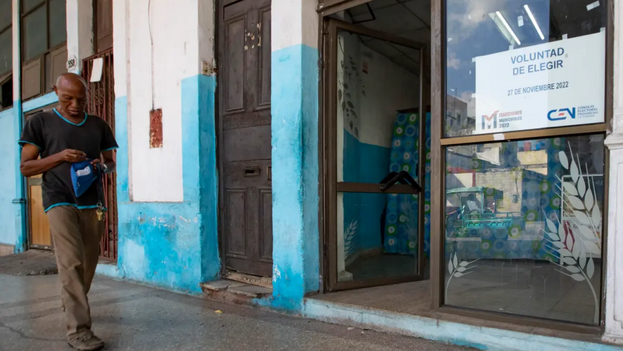
![]() EFE (via 14ymedio), Havana, 28 November 2022–Sunday’s municipal elections in Cuba are on track to surpass the highest ever abstention rates in local elections since these were first held on the Island in 1976.
EFE (via 14ymedio), Havana, 28 November 2022–Sunday’s municipal elections in Cuba are on track to surpass the highest ever abstention rates in local elections since these were first held on the Island in 1976.
Closing at 5 pm local time, according to the last information shared two hours prior to the closing of the polling places, which were set up in school buildings, the participation rate was 63.85% (36.15% abstentions), 18.2 percentage points below the rate recorded at the same time in the previous elections, in 2017.
Since 1976, when the first elections of this type were held since the triumph of the Revolution, the participation rate ranged between 98.7% in 1984 and 85.94% in 2017.
Voters seemed reluctant to participate although closing time was shifted by one hour, to 6pm local time, “at the request of the electoral councils of various territories and voters themselves,” explained the National Electoral Council (CEN) without providing more details.
The documented levels of demobilization are reminiscent of the 26% abstention rate in the referendum on the Family Code in September. At the time, Cuban President Miguel Díaz-Canel, referred to it as a “punishment vote” for the pandemic’s economic consequences.
Included among the reasons for this abstention rate, according to different observers, are: weariness among a portion of the population after two years of serious economic and energy crises; lack of information in the absence of electoral campaigns, and a call by the opposition, on the island and abroad, to not vote.
Early in the morning, Díaz-Canel highlighted from his own polling place that the country heads to the polls despite the “stifling economy” and a “smear campaign.”
“This exercise is a citizen responsibility because we are electing our representatives to municipal organizations, the country’s primary government structure. This is in line with the work in the last several years to perfect socialist democracy,” he added.
He stated that the district delegates who will be elected today “will take on and approve development programs according to the priorities of the country. Later, the communities participate to implement their own proposals which have been approved by their participation mechanisms.”
For a few weeks, different opposition groups — especially from the exile community — pushed the option of abstaining on social media, although there is really no way to measure the extent to which these might have influenced the final outcome.
Also in the morning, the Minister of Foreign Affairs, Bruno Rodríguez, stated that the dissident campaign “doesn’t make a dent” on people and predicted “very high participation.”
“These are attempts, they bark, which means we will get on the horse and move ahead (…) it is a shame,” added Rodríguez.
Thus, the elections occurred–as happened with the referendum on the Family Code, approved with 66.87%–amid the worse economic and energy crises since the 90s at least, which translates to shortages of basic goods, runaway inflation and blackouts which are ever longer and more generalized.
EFE was able to confirm a low turn out on a trip to three polling centers in the early hours of this election day. Those who appeared from the opening of the polls at 7:00 am were mostly older people or government sympathizers.
Another common denominator was the lack of voters younger than 30. According to official data, 22,205 young people were eligible to vote for the first time.
For Richard Romero, 41, we need to “reach” young people. “We need to know how to approach them. Young people are into other things,” he told EFE after casting his vote in the Havana municipality of Playa.
During this trip EFE was also able to confirm a certain level of ignorance, among what more than a few participants, about the role of neighborhood delegates on the political organization chart.
Delegates are responsible for the direct management of problems and complaints in their communities and sit on the Municipal Assemblies of the People’s Power, the administrative level closest to citizens. Among the functions of this assembly is putting in place a Commission of Candidates, which selects candidates for Cuba’s unicameral parliament.
These elections are, in fact, the start of a process which will conclude next year to form the Parliament, which in turn, will elect the President of the Republic. Díaz-Canel could opt for a second consecutive term, according to the Constitution of 2019.
On the Island, political campaigns do not exist. However, in the days prior to the election, state media shared information on the elections, although without providing practical details nor stressing the importance of the election as the starting point for the process of replacing principal positions in the country.
This last scope was unknown to a significant number of the voters interviewed outside their voting centers, including the spokeswoman for one of the voting locations. “I don’t know, they help us a lot, but I wouldn’t know what to say about that.”
Another element which marked the day were the complaints of independent civil society due to the arrests of activists who attempted to exercise their right as observers of the process. They also denounced that security forces prevented some of them from leaving their homes.
According to official data, of the more than 26,000 candidates who ran in the elections, 70% are from Cuba’s Communist Party (PCC) or the Union of Young Communists. In addition, 44% are women, 7% are young people and only 27% were incumbents seeking an additional term.
Translated by: Silvia Suárez
____________
COLLABORATE WITH OUR WORK: The 14ymedio team is committed to practicing serious journalism that reflects Cuba’s reality in all its depth. Thank you for joining us on this long journey. We invite you to continue supporting us by becoming a member of 14ymedio now. Together we can continue transforming journalism in Cuba.
